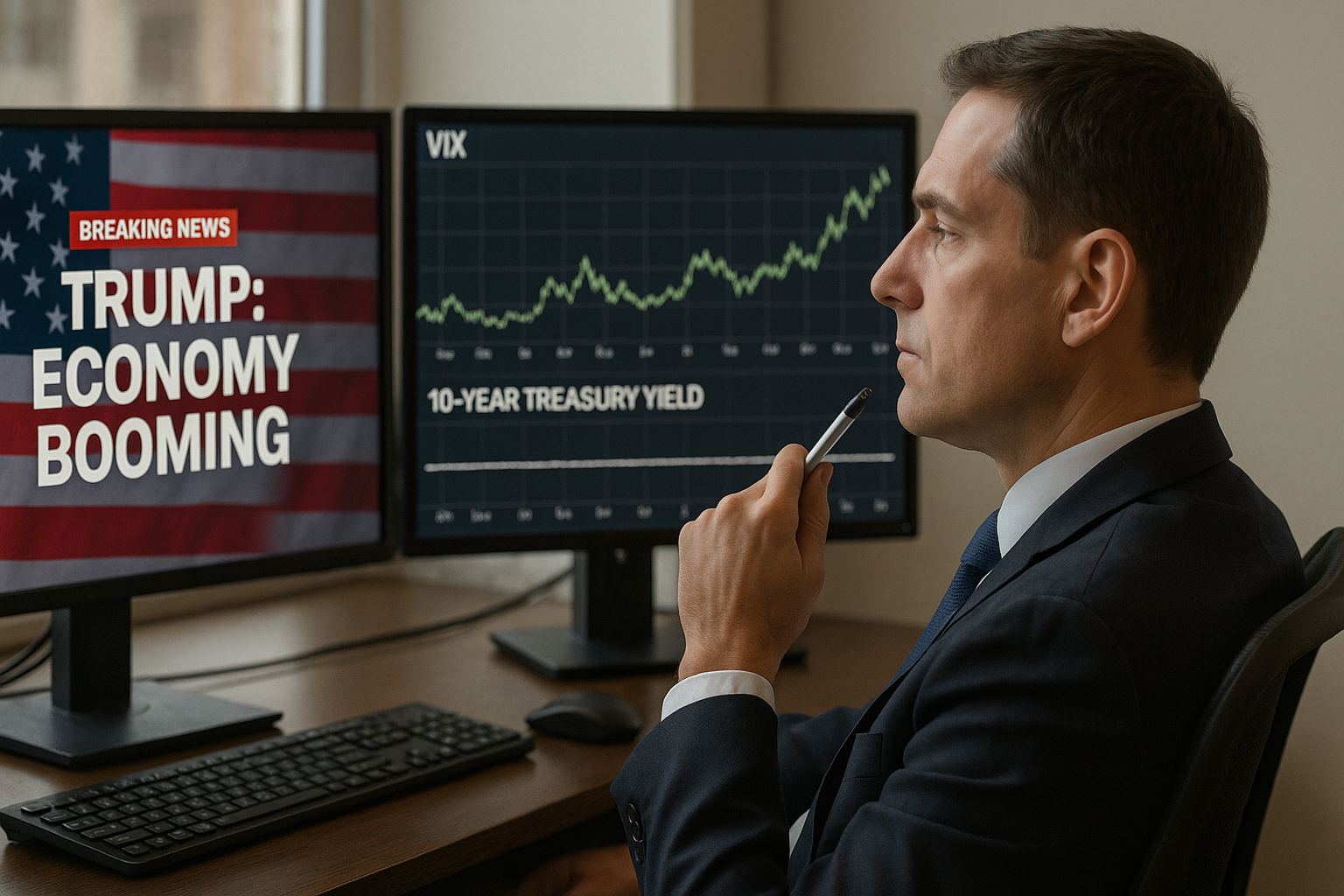Former President Trump has been making the rounds lately, telling anyone who'll listen that the U.S. economy is "absolutely booming" – and naturally, taking full credit for supposedly setting the stage during his administration. Classic campaign season stuff, right?
But here's the thing that's actually worth paying attention to: not the predictable political chest-thumping, but how financial markets are digesting these claims as election uncertainty looms larger on the horizon.
Markets, for all their complexity, are essentially amoral calculation machines with a paranoid streak. They couldn't care less about political personalities except for how they might impact the bottom line – profits, interest rates, regulatory landscapes. So when Trump makes these sweeping economic declarations, the real question becomes whether investors are actually buying what he's selling.
And the answer? It's... complicated. (Isn't it always?)
The VIX – that infamous "fear gauge" that measures expected market volatility – has been inching upward lately, but remains well shy of panic territory. This suggests a market that's acknowledging election uncertainty exists but isn't losing sleep over it. The professional money seems to be hedging rather than making all-or-nothing bets on either candidate's victory.
I've always found that political market moves follow a pattern: "discount the obvious, bet on the obscure." Markets have already priced in the headline scenarios we all can imagine – Trump wins, Biden wins, gridlocked Congress, and so forth. The real opportunity for investors comes from identifying those second-order effects that the broader market hasn't fully processed yet.
Consider Trump's promise to slap broad tariffs on imports if he returns to office. The market reaction has been surprisingly muted. Why? Because investors have seen this movie before. During Trump's first term, many of his tariff threats functioned more as negotiating tactics than permanent policy fixtures. The market learned to discount the initial bombastic rhetoric and wait for the eventual compromise.
Some sectors, though, are clearly positioning themselves for potential Trump policies. Defense stocks have outperformed lately – likely pricing in expectations of increased military spending. Crypto assets jump whenever Trump says something nice about digital currencies (which, if you've been paying attention, has been happening with increasing frequency). And companies with high effective tax rates have shown subtle outperformance, suggesting some investors are betting on corporate tax cuts in a second Trump term.
But here's what I find most fascinating: the bond market's reaction. If investors were truly embracing Trump's economic boom narrative, you'd expect to see rising yields reflecting inflation concerns. Instead, the 10-year Treasury yield has remained relatively stable around 4.2-4.3%. This suggests fixed-income investors are skeptical about claims of an impending economic surge – or they believe the Fed will keep its hawkish stance regardless of November's outcome.
Look, there's always daylight between political rhetoric and market reality. When politicians talk about "booming economies," they're speaking an entirely different language than investors using actual metrics to assess economic conditions. Politicians deal in absolutes; markets price probabilities.
The current economic data? It's a mixed bag that neither fully supports nor demolishes Trump's characterization. GDP growth has shown resilience, but manufacturing continues to struggle. Consumer spending has held up despite high interest rates, but housing affordability sits at multi-decade lows. Corporate earnings have generally beaten expectations, but forward guidance has been... let's call it "cautious."
This ambiguity explains why election years often feature markets that bounce around like a ping-pong ball. Investors aren't just calculating who'll win in November – they're gaming out the entire cascade of policy changes that might follow, from tax structures to regulatory approaches to international trade relationships. And they're doing all this while simultaneously keeping tabs on the Fed's inflation battle, various global hotspots, and technological disruptions.
The savviest investors I've spoken with aren't making simple binary bets on who wins in November. Instead, they're constructing portfolios designed to weather multiple scenarios while exploiting specific inefficiencies where political narratives have created mispricing.
Which brings me to what I think is a useful framework for approaching political market moves: separate the signal from the noise. Trump's "booming economy" claims are mostly noise – standard campaign positioning that sophisticated market participants largely tune out. The signal will emerge from specific policy proposals that have credible paths to implementation and direct implications for corporate profits.
As November approaches (and it's coming faster than many of us would like), expect markets to grow increasingly sensitive to polling shifts, debate performances, and policy specifics. But also expect them to maintain their characteristic cynicism about political promises – from any candidate.
In the meantime, the most successful investors will continue doing what they've always done – looking past the headlines to identify those second and third-order effects that others miss. Because in markets, just as in politics, the obvious rarely delivers exceptional returns.




